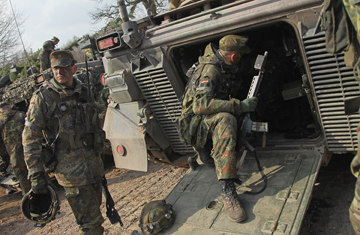
Troops of the 37th Armored Infantry Brigade (37. Panzergrenadierbrigade) prepare to board their Marder light tanks.
It's never easy to balance idealism with political realities, but as Germany grapples with the challenges posed by the Arab Spring it is sometimes hard to tell which side Berlin is on.
The capital's latest foreign-policy faux pas is an alleged behind-closed-doors deal to sell state-of-the-art tanks to Saudi Arabia. The deal — so secret the government won't even acknowledge it was ever discussed — has kicked up a firestorm of protest, uniting an unlikely coalition of leftist politicians, human-rights groups, church leaders and senior members of Chancellor Angela Merkel's own Christian Democratic Union (CDU) party.
News of the deal broke on Sunday, when the newsweekly Der Spiegel reported that Germany's ultra-secretive Federal Security Council, whose members include Merkel, Foreign Minister Guido Westerwelle, and Defense Minister Thomas De Maiziere, approved the sale of 200 Leopard 2 tanks, Germany's most modern battlefield tank, to Saudi Arabia. During a meeting of the CDU parliamentary group on Monday, Norbert Lammert, the president of the Bundestag — the German parliament — and Ruprecht Polenz, head of parliament's influential foreign affairs committee, argued forcefully that Germany could not sell such heavy arms to a country known for routine violations of the most basic human rights. "Such decisions cannot be taken at a time when people are fighting for democracy in the Arab world," said Juergen Trittin, a Green Party leader, on German television on Tuesday.
Protests have also been raining in from church leaders and human-rights activists, who argue that Saudi Arabia is on the wrong side of history in the tide of rebellion sweeping through the Arab world. As the momentum of protests in Tunisia and Egypt carried the Arab Spring into the tiny nation of Bahrain last March, some 2,000 troops from Arab nations close to the ruling monarchy, including heavily armed Saudis, quashed the rebellion. Meanwhile, the German government still faces criticism for abstaining from the U.N. Security Council vote authorizing air strikes in support of Libyan rebels, and still refuses to offer direct military aid, even after softening its position (it does provide about $5.3 million in financial assistance for NATO's Libya mission.) Against that backdrop, even Merkel's closest party allies are at a loss to justify the sale of weapons to a nation with a history of oppression.
The deal, were it to take place, is stunning not only because of the political signal it sends to pro-democracy activists in the Middle East and North Africa. A weapons sale of that order would mark a significant change in German arms-export policies. For the past 20 years, Germany has refused to sell such heavy artillery to the Saudis, citing concerns over human-rights abuses. German law also forbids weapons exports to countries engaged in a direct conflict — though the definition of conflict is open to interpretation.
But maybe Merkel's tank deal with the Saudis isn't about politics at all. Even in Germany's booming economy, with unemployment at a record low, the country's defense manufacturers are in anything but a growth industry and depend on getting a little help from their friends. Had Germany refused to sell the modern Leopard 2 tanks to the Saudis, Riyadh would likely have just shrugged off Berlin's snub and turned to the Americans, who view the Saudis as staunch allies in the war on terror and a bulwark against Iranian influence in the Middle East.
The Leopard 2 tank is manufactured in Germany but is also produced under license in Spain. And the Saudis are believed to have also negotiated with the Spanish, putting Madrid and Berlin in competition for defense jobs. Germany has a small army and with the end of the Cold War there is little requirement for tanks like the Leopard 2 on potential European battlefields. NATO is scaling back its traditional European land defenses in favor of lighter, rapid deployment forces to support campaigns out of the European theater, such as Afghanistan. The shrinking demand at home leaves defense companies looking abroad for contracts.
German defense contractors employ about 80,000 people and in 2009 Germany was the third-largest weapons exporting nation, according to the Stockholm International Peace Research Institute. The Institute's data shows that by 2009, Germany's share of the world weapons trade — which included tanks, submarines, and firearms — had doubled to 11% over the previous decade (U.S. manufacturers claimed 30% of the world market and Russia 23%), with Greece, South Africa and Turkey among its biggest customers. "The German arms industry depends on exports," says Henning Riecke, a security expert at the German Council on Foreign Relations. "Germany supports peaceful change and democracy in the Arab world, but clearly the government doesn't think the sale of arms to the Saudis would affect the spread of change in the region."
But Germany's arms merchants are dogged by the shadow of the past, and the legacy of German industry titans like Krupp, which armed Hitler, enabling the Nazis to unleash death and destruction on Europe. After World War II, Germany's ability to manufacture and export arms was curbed and it has always been considered bad taste to be seen supplying weapons to countries at war. "If the Arab Spring continues and spreads into Saudi Arabia, tanks like [the Leopard 2] could be used against demonstrators," Michael Brozska, a security expert with the Institute for Peace Research and Politics, told German television on Tuesday. For all the economic benefits a deal with Saudi could bring, many Germans fear that they may one day see TV news images of tanks made in Germany rolling into crowds of protestors in Riyadh.
